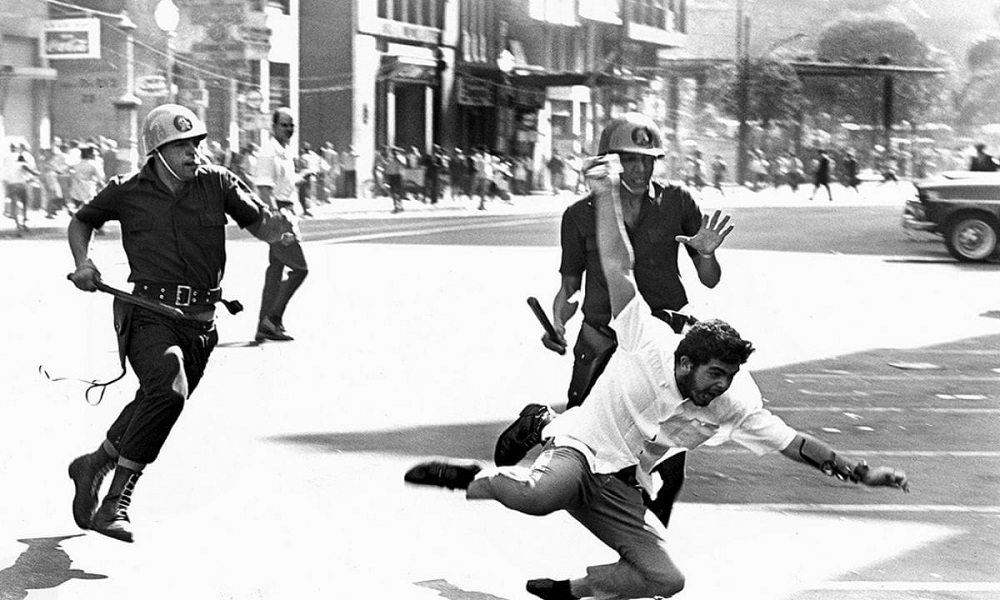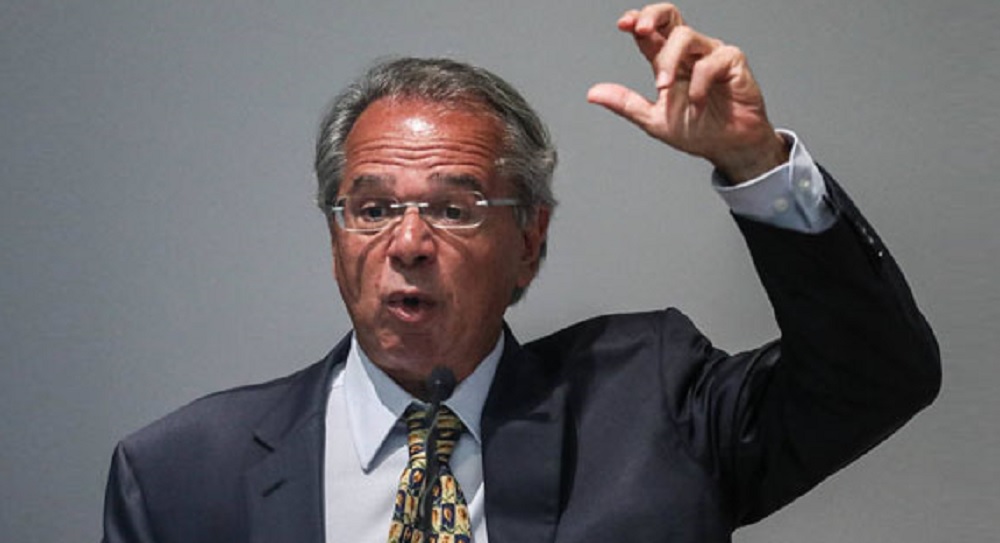RIO DE JANEIRO, BRAZIL – On December 13th, 1968, when the Government of Marshal Costa e Silva promulgated the decree known as Institutional Act number 5 (AI-5), the Minister of Finance Antonio Delfim Netto justified his vote in favor of the measure as follows: “I believe that the revolution came not only to restore administrative morality in this country but mainly to create the conditions that would allow it to modify the structures so as to favor economic development”.

On Monday, almost 51 years after that date, marked by the institutionalization of political persecution and terror committed by the Brazilian state during the military dictatorship (1964-1968), the current Minister of Economy, Paulo Guedes, revived this memory.
“Don’t be alarmed then if someone asks for the AI-5. Hasn’t it happened once before? Or was it different? Taking the people to the streets to destroy everything. This is stupid, it’s dumb, it’s not up to our democratic tradition,” he said during a press conference in Washington.
Guedes was talking about the massive street protests that plunged some countries in America into real social upheaval. Particularly in Chile, where the population has been calling into question the liberal model implemented by the Pinochet dictatorship (1973-1990) and which is the main reference for the minister of Jair Bolsonaro‘s ultra-right government.
Regarding the risk of a potential contagion of these demonstrations on Brazilian soil, he called for the opposition to “be responsible” and practice democracy. “Or is it democracy only when your side wins? When the other side wins, after ten months, do you already call everyone to destroy the streets? What kind of responsibility is this?”
When asked by journalists about the slowdown in the pace of economic reforms for fear of former President Luiz Inácio Lula da Silva, Guedes answered: “Apparently I say no [Bolsonaro is not afraid of Lula]. All he asked for was the exclusion of illegality. He’s not afraid at all, he puts in exclusion of illegality”.
Guedes then reasoned that a new AI-5 “is inconceivable,” even “if the left-wing take up arms”. But the mention of the dictatorship’s decree in a threatening tone comes at a time when the Brazilian far-right is arming itself with legal instruments to justify radical actions against potential demonstrations in Brazil.

Less than a month ago, Federal Deputy Eduardo Bolsonaro, the #3 son of President Jair Bolsonaro, said in an interview that if the protests in Chile were to be repeated on Brazilian soil, a new AI-5 could be published.
“If the left-wing radicalizes to this point, we will need a response. And a response could be through a new AI-5, it could be through legislation passed through a plebiscite, as occurred in Italy. Some responses will have to be given”.
Despite his father’s disenfranchisement at the time, radicalization is still on the government’s horizon. Last Thursday, Bolsonaro sent a bill to Congress seeking to exempt from punishment the military, federal police and agents of the National Force (formed by police from several states) who commit excesses or kill during operations under the presidential decree of Guarantee of Law and Order (GLO).
In the latter, he made it clear that his intention was also to repress protests. “They will set fire to buses, the innocent may die, they will set fire to banks, they will raid the ministry, that would not be a protest. And if there is, there will be a GLO. If Congress gives us what we are asking for, this protest will simply be prevented from being carried out,” said the President on his way into the Alvorada Palace, as reported by Folha.
The president also assured that he will forward a bill to Congress to allow GLO operations in the countryside, to ensure the repossession of rural properties.
The bill sent to Congress on Thursday was also signed by the ministers of defense, General Fernando Azevedo Silva, and Justice, Sérgio Moro. “There is no point in someone being very well off if they are worried about going out on the street in fear of a cell phone thief. Cell phone thief must go to jail,” said Bolsonaro at the time.
The extension of the exclusion of illegality during operations under the GLO complements the Anticrime Package sent by Moro to Congress. Its original text provided that agents who allege “excusable fear, surprise or violent emotion” after killing can go unpunished. This part was excluded from the bill by the deputies in the Chamber’s Public Safety Committee shortly after the death of 8-year-old Ágatha Félix, but Moro made an appeal on the same Thursday to include the passage back in the full chamber vote.
In any case, the police already kill with impunity in Brazil. In Rio de Janeiro, studies and reports show that more than 90 percent of deaths committed by state agents are not investigated or end up being shelved. Between January and October this year, Rio’s police, commanded by Governor Wilson Witzel, has already killed 1,546 people.
The data, released on Monday, are from the Institute of Public Safety (ISP), an agency linked to the Rio State Government. They show that, two months before the end of 2019, Rio’s police have already killed more than in any other year since police fatality started to be recorded, in 1998.
The figure represents more than 30 percent of all violent fatalities in the State and, while high, refers only to cases in which police officers admit to having killed a person and record their accounts in the official bulletin, always alleging exchange of gunfire or legitimate defense.

A Government licensed to kill
If the National Congress approves the last measure proposed by Bolsonaro, officers acting under the direct order of the Federal Government will be free to kill. Something that by itself is already being compared, considering the proportions, as a potential return of authoritarian tools that were available after the AI-5 decree.
For historian Carlos Fico, a professor at the Federal University of Rio de Janeiro (UFRJ) and a specialist on the Brazilian military dictatorship, the Bolsonaro clan is re-editing the strategy of the past to conjure up an alleged threat from the left-wing.
“The progressive camp is defeated, without initiative, it seems still surprised by Bolsonaro’s victory. I don’t see any threat of radicalization [from the left-wing],” he said during an interview with EL PAÍS earlier this month.
In 1968, when the AI-5 was edited, there was no real threat from progressive forces either. “There were armed actions, but few. The AI-5 dates back to the end of 1968, a year of peaceful demonstrations, mainly by the student movement. So, also at that time, these demonstrations were used as a pretext. And now there is nothing, nothing is happening”, reinforces the historian.
However, Fico argues that, unlike the hard-line military of the regime, Bolsonaro has no ideological basis. He also does not believe that the Brazilian Armed Forces are interested in a new authoritarian power project. “Today, President Bolsonaro has no ideological or doctrinal depth, none of that. I think he came to the presidency a little by chance, largely because he was spared a more extensive public exposure thanks to the terrible stabbing incident. As a result, he managed to avoid attending any debate,” he argued.
“He is being driven by this political intuition, which he certainly has, much guided by authoritarianism, violence, and unpreparedness,” he added.
The statements by Minister Guedes generated a flood of criticism. “The AI-5 is incompatible with democracy. The future is not built on failed experiences of the past,” said on Tuesday the president of the Supreme Court (STF), Antonio Dias Toffoli, during the National Meeting of the Judiciary in Maceió (AL). The Chamber’s President, Deputy Rodrigo Maia, recalled that the AI-5 provided for the closure of the National Congress and the suspension of constitutional rights, such as the Habeas Corpus, in a conversation with the newspaper Valor Econômico.
“To use [the AI-5] this way, even if it is to criticize radicalism from the other side, doesn’t make sense. What does one have to do with the other?” he asked. “You’re using an argument that doesn’t make sense from the point of view of rhetoric, and because it doesn’t make sense, you end up generating insecurity in all of us about what is the intent behind the recurring action of this word [AI-5],” he added.
Criticism also stemmed from people who identify with the economic liberalism idealized by the minister. “There is no ‘but’, no ‘however’, no ‘yet’, no other adverse conjunction. When, and if, there are protests, democracy is fully equipped to deal with them. Nothing justifies authoritarianism; as simple as that,” said economist Alexandre Schwartsman on Twitter. “And the mask of liberalism has fallen. Nobody joins Bolsonaro’s government by chance. The streets are quiet. Not his head,” said economist Elena Landau.
Meanwhile, Eduardo Bolsonaro’s statements led the opposition to lodge a criminal complaint with the Supreme Court and instigate proceedings before the Chamber’s Ethics Committee. “You can’t punish anyone for thinking or believing in something, but for what they do. Another very different thing is to advertise acts that violate the democratic rule of law. That’s what the deputy did,” explained Fico. In his opinion, Eduardo should be punished with the annulment of his mandate and the justices of the Supreme Court may consider that he committed a crime.

“This is not simply an opinion, but a crime, which is even provided for in the National Security Law that has been in force in Brazil since the time of the dictatorship. It clearly states that propaganda of means capable of attacking the rule of law, institutions… is forbidden,” she explained.
Fico also believes that statements by Eduardo Bolsonaro, the country’s most voted federal deputy, also reflect the president’s thoughts and desires, as an aggravating factor. And that a punishment would be an opportunity for Brazilian institutions to effectively prove themselves as a counterweight to the presidential will. “If they go on like this, it will become an act of leniency in relation to all these statements, which have now overflowed from a simple point of view, from a simple opinion to a clearly criminal situation,” he argues.
“It is an important test because it would be a form of affirmation. Even if it comes in the form of a soft punishment, a simple warning, it would be healthy for the current moment of Brazilian politics”, he adds.
Alliance for Brazil, the new ultra-right-wing party
The radicalization promoted by Bolsonaro and the closest members of his government comes in the wake of the formation of his new party, the Alliance for Brazil, officially announced last Thursday. The president has been seeking to merge the most radical allies of Bolsonarism and imprint his extremist ideology in a legend entirely controlled by himself – who will chair the new party – and his son, Senator Flávio Bolsonaro – as vice-president.
Having signed his PSL disaffiliation, a party he joined to contest the 2018 elections and which is being investigated for promoting strawmen candidacies, the president seeks to follow in the footsteps of other leaders of the ultra-right in the world, such as the French politician Marine Le Pen and the Hungarian premier Víktor Orbán. In common, the ultra-conservative leaders control parties made to measure for them with an iron fist. There can be no breaches in an authoritarian project.
The extreme right-wing ideology of the Alliance for Brazil begins with its logo and its number. Last week, Bolsonaro was presented with a plaque on which projectiles of various calibers formed the party’s name. The number of the party in the voting rolls will be 38. While his supporters celebrate the coincidence with the .38 caliber revolver, Bolsonaro said it is due to the fact that he is the 38th president of the Republic. Even so, one of his priorities is to promote the carrying of weapons.
“The party is committed to fighting tirelessly until all Brazilians can have their inalienable right to own and carry weapons for their defense and that of their own,” said lawyer Karina Kufa, as she read the new party’s program during its launching act last Thursday. Nearly 500,000 signatures still need to be collected from at least nine federal units to have its formation endorsed by the Superior Electoral Court.
The people closest to the president who are expected to migrate from the PSL to the Alliance for Brazil, have demonstrated their allegiance to his style week after week. In the week Black Awareness Day was celebrated, federal deputies Daniel Silveira – the same one who tore up Marielle Franco’s plaque during the campaign act last year – and Colonel Tadeu were against an exhibition in the Chamber of Deputies on the date.
After a plaque against the genocide of the black population was broken by Tadeu, Silveira said that blacks die more because they are the majority carrying weapons and committing crimes, in openly racist rhetoric. “Don’t blame the deaths on the State Police of Rio de Janeiro because a little black criminal must be forgiven,” he said.
In a clear counterpoint, Rodrigo Maia criticized the attitude of the Bolsonarist deputies and ordered that the exhibition be restored. In the same vein, state deputy of São Paulo Cauê Macris acted swiftly to ban a tribute to the dictator Augusto Pinochet in the Legislative Assembly of the State of São Paulo, promoted by deputy Frederico D’Ávila last week.
The historian Carlos Fico believes that the degree of virulence and radicalism promoted by the Bolsonaro clan may be a strategy due to some apprehension or fear: “Probably from these investigations that associate them with militiamen or the corruption of funds obtained as deputies. Flávio Bolsonaro is involved in corruption charges, and now there has been this murky affair in the Marielle Franco case.”

“So it’s a critical moment for the Bolsonaro family and for the president,” explains Fico, who also mentions some setbacks, such as the failed strategy of elevating Eduardo Bolsonaro to the post of Brazilian ambassador to the United States. “It’s all very confusing, so the worst picture we can have is of authoritarian politicians who are scared and cornered. They react in this authoritarian and violent way. But it’s not surprising, it’s very much in accordance with the thinking of many years before.”
Source: El Pais

